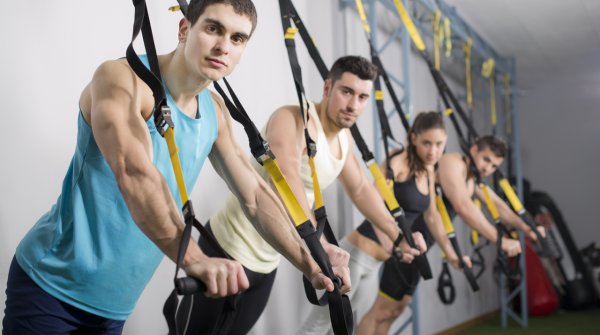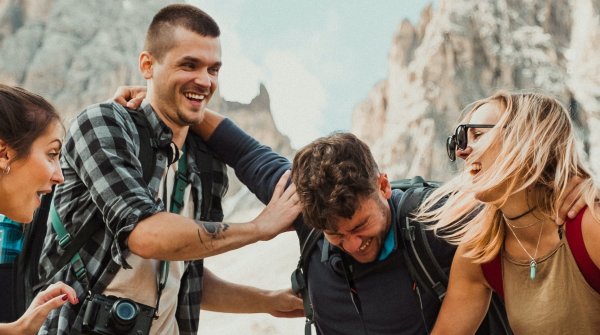
After lockdown comes recovery. That's how the fitness industry sees the time after the restrictions of the Corona pandemic. Because or despite the lockdown, society is moving - just a bit different than before. And the fitness studios are already working on new concepts for when they reopen - which will benefit customers.
At ISPO Munich Online 2021, CEOs and manager of various fitness providers discussed discussed under the motto: "What's next after the big fitness re-opening?" Among them were: Benjamin Roth, CEO & Co-Founder; Urban Sports Club, Ralph Scholz, President DIFG e.V.; Oliver Sekula, CEO Aciso Fitness and Health GmbH; Martin Seibold, Managing Director, Lifefit Group and Thorsten Rebeck, Managing Director BodyLife. A few thoughts on what to expect in the gym from 2021. There could be a lot of changes.

The biggest fitness trend of 2020? Well, sure: online fitness. When the gyms had to close, the fitness classes just moved to Zoom or Skype meetings. But, cautions Benjamin Roth of Urban Sports Club, "People don't just want to do exercise online. They also crave a professional environment and trainers."
This will indeed inevitably lead them back to the studios. But at the same time, after nearly a year of lockdown, people have now learned that home fitness works just fine - and in some cases, developed a lot of fun in the process. So the best of both worlds is likely to drive workouts in the future. Either online or studio? That will probably soon no longer exist, but the studios focus on hybrid fitness concepts. The combination strengthens not only the muscles, but also the connection between studio and customer.
"There's a big shift going on right now," says Ralph Scholz, president of the German Industry Association for Fitness and Health: "Because right now, people are saying: we want to combine sports - studio and outdoor activities." So outdoor activities like climbing or hiking. That's what the industry is adjusting to right now. It may well be that a stationary studio will therefore respond to needs in a more versatile way in the future.
After all, he says, studies have also shown that yoga and climbing go closely together for some customers, and swimming and the gym for others. "People want to mix things up," Roth says. And that's what matters. Not every gym around the corner will offer kayaking or stand-up paddling in the future - but some, especially those closer to nature, will recognize the trend and form previously unheard-of collaborations. It's a time of change for the industry, and customers will benefit from it too.
In other areas, the topic of outdoor fitness has recently gained momentum anyway. Because intensive training is less dangerous outdoors than indoors, some fitness studios have already moved equipment or courses outdoors.
Small and fine: This is the advantage offered by boutique studios, in which a single personal trainer is usually responsible for fitness - this trend will also continue to grow. The mini-studios may be more expensive than the big competitors, but they offer custom-fit training with a responsible coach - and thus the chance of faster fitness success.
"There are now four or five different market segments in our sector," says Martin Seibold, Managing Director at LifeFit Group, which includes Fitness First, for example, as well as Elbgym, Club Pilates and the boutique concept The Gym Society. At the same time, differentiation tailored entirely to fitness enthusiasts leads to greater satisfaction among all parties involved: operators, trainers and customers.
Jacob Fatih, once the founder of FitX, who now wants to motivate others to found start-ups with the company Crealize, currently sees three different paths for re-opening after the lockdown. "There will then be special interest gyms or newfound gyms. They won't be the same gyms as before." He also thinks studios will get closer to customers locally as well.
Yoga or mental training are of course old hat as a trend. Nevertheless, the pandemic has once again acted as an accelerator for fitness and health. Fatih therefore expects a combination of physical, competitive and mental training in the future. It goes without saying that due to the current situation, hygiene rules must also be observed in the studios for the time being.
In addition, Jacob Fatih suspects, "The big run on the gyms won't just be because of the sport there, but also because of social interaction." And what better way to do that than to experience a mix of physical training and mental relaxation alongside it?
Finally, the pandemic also reveals the health dangers of an overly unsteady lifestyle. Athletic people in particular, after all, usually get through a Covid 19 illness more easily. "There's a much greater focus on health and activity," Seibold observed. "Which is fantastic for everyone in the ISPO network."
 Know-HowThe 11 Best TRX Exercises
Know-HowThe 11 Best TRX Exercises
- Awards
- Mountain sports
- Bike
- Fitness
- Health
- ISPO Munich
- Running
- Brands
- Sustainability
- Olympia
- OutDoor
- Promotion
- Sports Business
- Textrends
- Triathlon
- Water sports
- Winter sports
- eSports
- SportsTech
- OutDoor by ISPO
- Heroes
- Transformation
- Sport Fashion
- Urban Culture
- Challenges of a CEO
- Trade fairs
- Sports
- Find the Balance
- Product reviews
- Newsletter Exclusive Area
- Magazine





